Can a machine teach English?
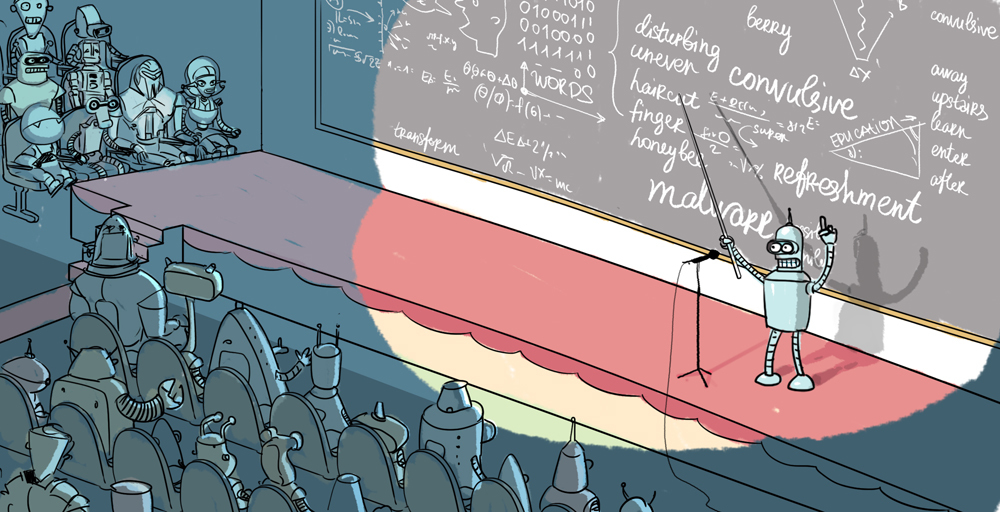
Donald Trump bitcoin bot, AlphaGo victory over one of the strongest players in th Lee Sedoll, learning English - what unites these three situations? Everywhere, to one degree or another, machine learning is present.
A computer can not only generate a storyline like Scheherazade, or respond to letters instead of users like Google Smart Reply, but also create perfect English textbooks.
To help the teacher
At Skyeng, all teachers give lessons using the Vimbox online interactive platform. All lesson materials, exercises, texts, audio and video files are stored on the platform. The lesson on Vimbox is planned in minutes: the teacher sees tips on what questions to ask the student, how best to work out the exercise and what to ask at home. Classes are held in an interactive format - the teacher sees how the student performs the exercises, what words he adds to the dictionary and what grammatical constructions cause difficulties for him; at the same time, he can quickly help, explain the desired topic.
A large amount of statistics is collected in the process. The platform captures all the actions of the student and teacher - how much they spoke, what language, how quickly the student did the exercises, what answers he got and where the teacher helped him. We can evaluate the volume of homework, the speed of interaction with texts and exercises, the volume of explanations, the number of records listened to, and many other parameters of the teacher-student interaction in the lesson. The student can give an assessment both to the materials of the lesson and to the teacher (the teacher does not see this assessment).
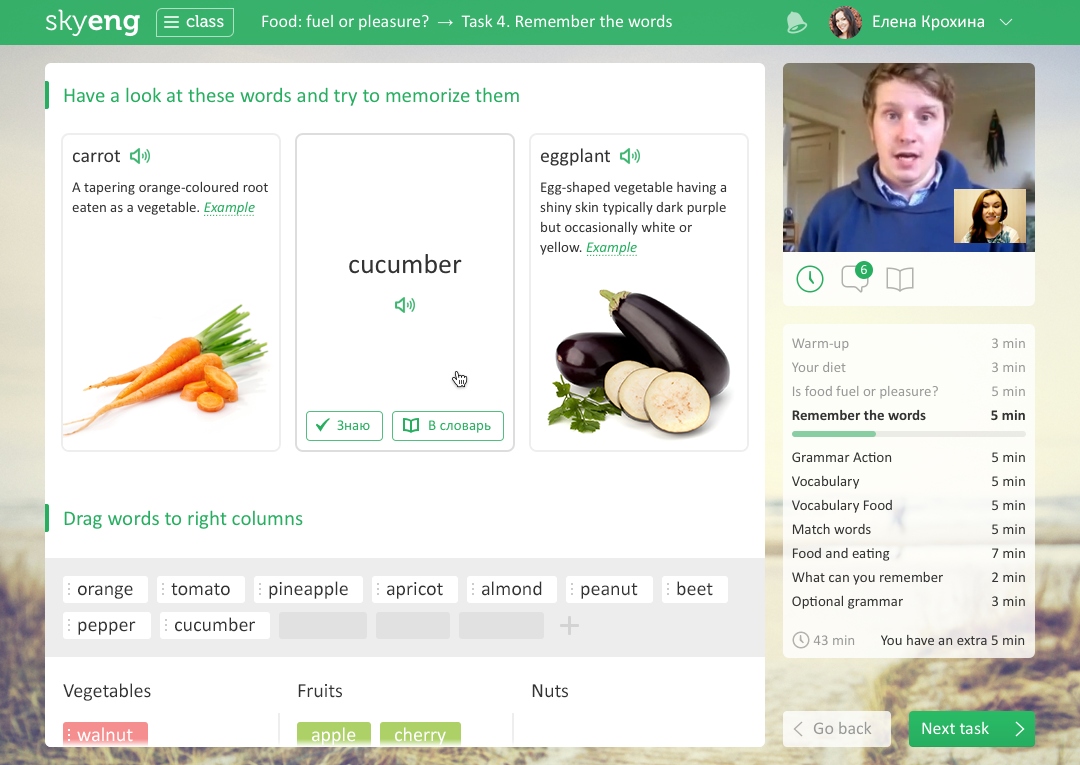
This dataset serves as an assistant for the teacher. Before each lesson, the system will remind him how much vocabulary the student has, what problems had to be encountered in previous classes, what tasks were given and how quickly the student dealt with them, etc., up to his interests and hobbies. This is an important help, since the teacher cannot remember all the details about each of his students. However, while the teacher analyzes this information on his own and builds a lesson based on his own conclusions. Can a learning machine help him?
We think so. The amount of information collected during the lessons is so large that the teacher simply cannot digest it all in five minutes of preparation for the lesson. And the car is quite. Moreover, she can compare the data of a particular student with a database of all students, identify patterns, and based on this array analyze the current lesson on the fly, giving the teacher tips: the student will have problems with this grammatical construction, focus on her ; this task can be skipped because it will not cause any difficulties, we replace it with this; This topic is interesting to the student, but with this one he will most likely “close”, etc. The learning machine becomes a kind of second, backstage teacher, increasing the effectiveness of the lesson.
The use of machine learning is beneficial to us and commercially:
- Saves the time of teachers and methodologists. AI can take on both routine work and basic analytics;
- Increases the effectiveness of teachers. The machine will always tell you if the teacher forgot something, missed or made a mistake;
- Before us opens up a ton of new opportunities. We can create unique products that are not available to us before;
- finally, we can justifiably talk about our high-tech marketing materials.
Semantic analysis
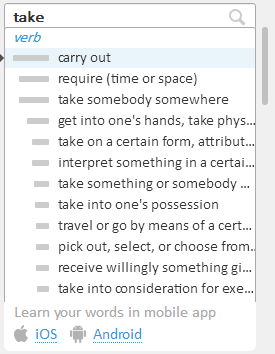 Another task from the field of language learning that can be successfully solved by machine learning is the creation of a semantic analyzer. Suppose you are reading text on your favorite website or post on a social network. You come across an unfamiliar word in English, you need a translation in this context. Not all variants of the meaning of the word presented in the English-Russian dictionary, and not a machine translation of the whole phrase, namely the translation of this word in this place. The semantic “parser” analyzes all the words in the text and the connections between them, makes markup to fetch the relevant meaning of the desired word.
Another task from the field of language learning that can be successfully solved by machine learning is the creation of a semantic analyzer. Suppose you are reading text on your favorite website or post on a social network. You come across an unfamiliar word in English, you need a translation in this context. Not all variants of the meaning of the word presented in the English-Russian dictionary, and not a machine translation of the whole phrase, namely the translation of this word in this place. The semantic “parser” analyzes all the words in the text and the connections between them, makes markup to fetch the relevant meaning of the desired word.To hammer in all possible semantic relations manually is an almost impossible task. Here, machine learning also comes to the rescue. The teacher in the course of a regular lesson simply “corrects” the automatic translation, and the analyzer, after looking at the surrounding text, tries to detect and remember all the patterns. A few such corrections - and the result of the translation becomes close to ideal.
A semantic analyzer will help you to read texts, immediately receive relevant translations and add words in the right meaning to your personal dictionary. In Vimbox, a dictionary is functionally associated with a mobile application that is used to repeat words between lessons. The work of the mobile application is based on an algorithm that copies the systematic operation of long-term memory, so memorization of words occurs not randomly, but at certain intervals. But this is the topic for a separate publication, which we are also preparing.
Perfect tutorial
The process of improving the content of educational materials is an important task that all world textbook publishers, such as Oxford University Press, Macmillan, Cambridge and Pearson, are concerned about. Invaluable help in this matter is provided by the rich statistical database on student-teacher relationships collected by Skyeng.
We analyzed 308,000 lessons held on the Vimbox platform and came to interesting conclusions. For example, there are exercises that teachers regularly skip and do not ask their students. There are exercises where the number of correct answers reaches 98%. We asked ourselves - what is the meaning of such exercises, are they not too light and obvious from the point of view of the student? Do they have a pedagogical effect?
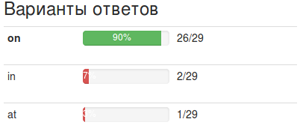
The teacher skips this or that exercise based on his own experience and intuition. Using machine learning algorithms and accumulated data, we can create a system that simulates the experience and intuition of all our teachers at once, and create with it a “perfect lesson” for each student, and from such lessons a personalized “ideal textbook”.
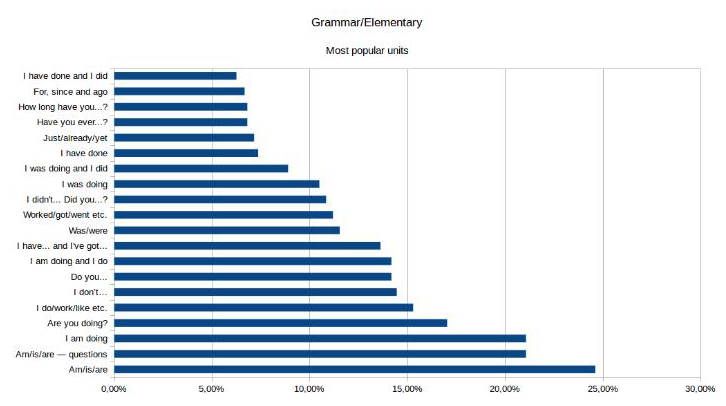
In learning English, you can analyze the textbook and make some kind of Google Knowledge Graph. For example, in what sequence is the previously passed material repeated, both lexical and grammatical, whether grammar is being studied correctly, how closely are the topics studied. You can identify the optimal listening length for a particular level of English, adjust the display of videos, the optimal model of alternating written and oral exercises - all this will be possible with the help of machine learning. We will be able to analyze typical errors in the students' written work in our Essay tool and check the work in a semi-automatic mode with the issuance of tips to optimize the work.
We are still at the very beginning of the journey, therefore we are actively interested in all modern developments in the field of machine learning, we are trying to participate in experiments related to this topic. One such experiment is the BlackBoxChallenge , a partner of which is Skyeng School. Python connoisseurs can try their hand at creating artificial intelligence - an agent sent to the Black Box, where unknown adventures and puzzles await him. At the entrance, participants do not have any information about what is happening in the Box, and they need to create an Agent who can learn how to play the game with unknown rules.
The competition is already coming to an end - decision-making ends on May 30.
The prize fund is 600,000 rubles, now about 1,280 people are fighting for it.
